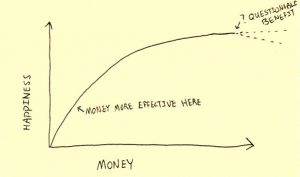By Nicolas Laing
Mission Partner serving in Uganda
“While Jesus was in Bethany in the home of Simon the Leper, a woman came to him with an alabaster jar of very expensive perfume, which she poured on his head as he was reclining at the table. When the disciples saw this, they were indignant.
“Why this waste?” they asked. “This perfume could have been sold at a high price and the money given to the poor.”
Aware of this, Jesus said to them, “Why are you bothering this woman? She has done a beautiful thing to me. The poor will always be with you…”
These words are so profound I can’t do them justice, but here goes!
The Disciples’ Perspective: “Why this waste?”
It should both empower and chill us to the bone that much of the money we spend on ourselves would be better spent by someone less well off. This makes intuitive sense. One extra dollar won’t even buy us a coffee and we barely notice if one extra dollar enters our bank account. But imagine if you only earn one dollar a day. That extra dollar buys the pen and book which allows your child to go back to school. So much value, relief, and joy from just one dollar! This utilitarian thinking is behind that effective but oh-so-cringe fundraising technique:
“For the cost of just one coffee a day, you could feed/clothe/educate/save/empower….”
Experience, the disciples and science tell us that once we achieve a middle-class income, every extra dollar we spend only increases our happiness by a tiny amount. As a 10-year-old I was overwhelmed with joy when I bought an ice cream with my pocket money. I remember the euphoria of buying a watch with my first pay cheque from a summer job. This dwarfs the negligible serotonin hit I get these days every time I buy a new Ferrari…. (Joking!)

Credit: The Happy Philosopher
So, if we have this remarkable power to love others with our money more effectively than we can love ourselves, perhaps the best thing to do is to give away every dollar we earn over a certain amount. The extra money will hardly help our happiness, but imagine what it could do for someone else? If we earn 70,000 dollars a year, how can we justify keeping more than say $50,000 when that extra 20,000 dollars could transform the life of someone less fortunate? Whenever we spend excess money on relatively frivolous things, the disciples’ cry of “why this waste?” rings in our ears.
Mary shocks the disciples when she pours out a half litre of high-end nard perfume on his feet. Imagine the cost of a half-litre of Chanel no. 5. How would you react when it was poured out in front of you It’s hard to argue with the disciples’ logic “This perfume could have been sold at a high price and the money given to the poor.”
But Jesus immediately replies “Why are you bothering this woman? She has done a beautiful thing to me.”
Jesus sees her loving heart. What was a flagrant (fragrant?) waste of money was also an instinctive, selfless act to honour someone who had turned her life around. If someone had pulled you out of poverty and an abusive life controlled by men, would you not have done the same?
Jesus knows that we are compassionate human beings, and there are moments when we will lavish our resources on things that don’t make utilitarian sense. Maybe this isn’t the most logical or strictly ‘best’ thing to do, but it’s deeply human and hey, we aren’t perfect. But straight after affirming Mary’s lavish love, Jesus’ challenge goes deeper than we could ever expect.
“The Poor will always be with you.”
This is where the rubber hits the road. At first reading Jesus might seem flippant, dismissing the plight of the poor, but only because (unlike the disciples) we don’t know what he’s quoting. This is a direct quote from a 3000-year-old Deuteronomy passage, which calls for the kind of radical economic justice that would shock even a modern-day left-wing politician.
“The poor will always be with you. Therefore, I command you to be openhanded toward your fellow Israelites who are poor and needy in your land.”
In Deuteronomy 13, God commands that his people should cancel ALL debts every seven years (what?!), and they should lend people “Whatever they need” even in the year before the debts are forgiven. After six years of service, richer Israelites should not only release any servants working for them, but send them off with animals, crops, and wine to kick-start their new life. This economic agenda is so radical and so far ahead of its time, it’s no wonder the Israelites did a pretty bad job of actually implementing it.
Through invoking this passage Jesus goes deeper and takes us beyond simple arguments about whether a lavish act of perfume pouring makes logical sense. What matters is not whether this particular pot of perfume was wasted on a lavish act of love. What matters is that we devote our entire lives to economic justice. His point is that the poor will always be with us so poorer people will always be needing our love and help.
Serving others is a long game.
Becoming a person of generosity and love is not primarily about criticising others who might be wasteful, or virtue signalling on social media or voting for what we see as ‘progressive’ political parties, but about living whole lives of integrity and love. Lives bent towards those who are struggling and marginalised. Not just today, but tomorrow, and tomorrow next.
Jesus’ challenge “the poor will always be with you” is an invitation to follow him into a deeper journey, beyond the hustle and bustle of trying to ‘Make it’, the distraction of social media, and the polarisation of modern politics. A journey which will cost us much, but give us so much more. Are we willing?
It’s also not a surprise that this whole thing happened while Jesus was visiting Simon, a man with leprosy, a crippling disease full of social and religious stigma.
This article was taken from Nic’s blog Uganda Panda. Learn more about Nic and Tessa Laing here.

0 Comments